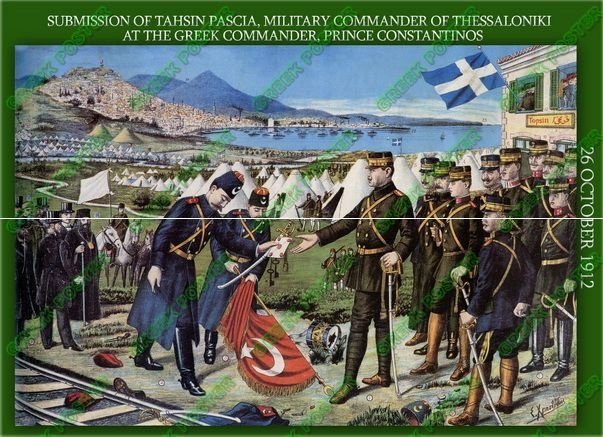What you do not know about the Balkan war
What you do not know about the Balkan war

The Balkan Wars (Turkish: Balkan Savaşları, literally "the Balkan Wars" or Balkan Faciası, meaning "the Balkan Tragedy") consisted of two conflicts that took place in the Balkan Peninsula in 1912 and 1913. Four Balkan states defeated the Ottoman Empire in the first war; one of the four, Bulgaria, suffered defeat in the second war. The Ottoman Empire lost the bulk of its territory in Europe. Austria-Hungary, although not a combatant, became relatively weaker as a much enlarged Serbia pushed for union of the South Slavic peoples.[1] The war set the stage for the Balkan crisis of 1914 and thus served as a "prelude to the First World War".[2]
By the early 20th century, Bulgaria, Greece, Montenegro and Serbia had achieved independence from the Ottoman Empire, but large elements of their ethnic populations remained under Ottoman rule. In 1912 these countries formed the Balkan League. The First Balkan War had three main causes:[3][2]
The Ottoman Empire was unable to reform itself, govern satisfactorily, or deal with the rising ethnic nationalism of its diverse peoples.
The Great Powers quarreled amongst themselves and failed to ensure that the Ottomans would carry out the needed reforms. This led the Balkan states to impose their own solution.
Most importantly, the Balkan League had been formed, and its members were confident that it could defeat the Turks.
The Ottoman Empire lost all its European territories to the west of the River Maritsa as a result of the two Balkan Wars, which thus delineated present-day Turkey's western border. A large influx of Turks started to flee into the Ottoman heartland from the lost lands. By 1914, the remaining core region of the Ottoman Empire had experienced a population increase of around 2.5 million because of the flood of immigration from the Balkans.
Citizens of Turkey regard the Balkan Wars as a major disaster (Balkan harbi faciası) in the nation's history. The unexpected fall and sudden relinquishing of Turkish-dominated European territories created a psycho-traumatic event amongst many Turks that is said[by whom?] to have triggered the ultimate collapse of the empire itself within five years. Nazım Pasha, Chief of Staff of the Ottoman Army, was held responsible for the failure[citation needed] and was assassinated on 23 January 1913 during the 1913 Ottoman coup d'état.
Date 8 October 1912 – 18 July 1913
(9 months, 1 week and 3 days)
Location
Adrianople Scutari Kosovo Manastir Salonica provinces Aegean Islands Aegean Sea
Result
Treaty of London Treaty of Bucharest Treaty of Constantinople
Belligerents
First Balkan War
Ottoman Empire
Support
Austria-Hungary
First Balkan War
Montenegro
Greece
Serbia
Bulgaria
Support
Russian Empire
Second Balkan War
Bulgaria Second Balkan War
Montenegro
Greece
Serbia
Romania
Ottoman Empire
Commanders and leaders
Ottoman Empire Mehmed V
Ottoman Empire Enver Pasha
Ottoman Empire Nazım Pasha
Ottoman Empire Zeki Pasha
Ottoman Empire Essad Pasha Surrendered
Ottoman Empire Kölemen Abdullah Pasha
Ottoman Empire Ali Rıza Pasha
Ottoman Empire Hasan Tahsin Pasha Surrendered
Ottoman Empire İsmail Hakkı Pasha
Ottoman Empire Rauf Pasha Kingdom of Montenegro Nicholas I
Kingdom of Montenegro Prince Danilo Petrović
Kingdom of Montenegro Mitar Martinović
Kingdom of Montenegro Janko Vukotić
Kingdom of Bulgaria Ferdinand I
Kingdom of Bulgaria Mihail Savov
Kingdom of Bulgaria Ivan Fichev
Kingdom of Bulgaria Vasil Kutinchev
Kingdom of Bulgaria Nikola Ivanov
Kingdom of Bulgaria Radko Dimitriev
Kingdom of Greece Crown Prince Constantine
Kingdom of Greece Panagiotis Danglis
Kingdom of Greece Pavlos Kountouriotis
Kingdom of Serbia Radomir Putnik
Kingdom of Serbia Petar Bojović
Kingdom of Serbia Stepa Stepanović
Kingdom of Serbia Živojin Mišić
Kingdom of Romania Carol I
Kingdom of Romania Ferdinand I
Kingdom of Romania Alexandru Averescu